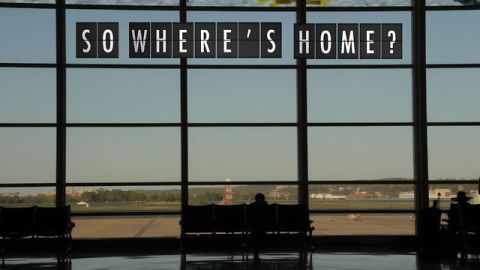This is one of the most difficult questions for a Third Culture Kid. The term Third Culture Kid was first used by American sociologist and anthropologist Dr Ruth Hill Useem in the 1950s to refer to a person who has spent a large proportion of their upbringing outside of their parents’ culture. This would typically include military, diplomatic, religious, businesses and NGOs such as branches of the United Nations.
 I was brought up in a British diplomatic family and by the time I finished secondary education I had attended eight different schools. My parents first moved overseas to Chile when I was two years old, which is how Spanish ended up as, technically, my first language. Unfortunately, we left when I was around six and I didn’t speak it again for another fifteen years, by which time I had lost a great deal of it. A few years ago I discovered in my parents’ house some old slides of tourist attractions in London. When I quizzed my mother why on earth she should want tourist slides of London she explained that she had bought them when we lived in Chile to ‘educate’ me and my brother about our home country, which was so remote to us.
I was brought up in a British diplomatic family and by the time I finished secondary education I had attended eight different schools. My parents first moved overseas to Chile when I was two years old, which is how Spanish ended up as, technically, my first language. Unfortunately, we left when I was around six and I didn’t speak it again for another fifteen years, by which time I had lost a great deal of it. A few years ago I discovered in my parents’ house some old slides of tourist attractions in London. When I quizzed my mother why on earth she should want tourist slides of London she explained that she had bought them when we lived in Chile to ‘educate’ me and my brother about our home country, which was so remote to us.
This is typical of the formative years of a TCK, moving regularly, attending multiple schools, picking up little bits of languages, making friends and losing friends. The only stability came to me when I was sent off to boarding school in the UK, where I managed to keep my friends longer than 18 months, the average stay of ex-pat students in many international schools. Good international schools were not available everywhere a generation ago, so my parents had little choice but to pack me off back to England. While you hear of many people who look back at life in boarding schools with indifference or loathing, I relished the opportunity to live in the same environment at least for three quarters of the year. Friends used to envy the ‘glamorous’ lifestyle of army or diplomat brats jetting off to exotic locations at the end of term.
The truth for me, and I suspect many of my TCK peers, was less than glamorous. My parents’ location didn’t feel like ‘home’- it was just the place I spent my holidays. Holidays spent away from friends and people to connect with. Trying to make friends in new countries when you are there for just a few weeks is not easy. I remember one family move where my parents’ didn’t tell me we were moving until I had returned to boarding school. Maybe I am being uncharitable and they didn’t know themselves, but this is not something unheard of in TCK families. To spare the stress of the impending loss of friends some parents choose to not tell their children until the last minute. No opportunity to say goodbye, make it feel a lot like grief, when a child is wrenched away, however noble the intentions.
The legacy of ATCKs or Adult Third Culture Kids is the ability to settle quickly into new environments and feel very comfortable in mixing with people of all backgrounds. The hidden side is often the inability to make lasting or deep friendships, because of the innate fear of investing much emotional energy into what could be a temporary relationship. Some ATCKs try to rebel against their past and deliberately stay put, but for many, their upbringing produces a restlessness and drive to constantly move on and become the permanent ex-pat.
This is why asking an ATCK ‘Where are you from?’ is excruciating. Do you give your home country? Your country of residence? Where you have lived the longest? Over the years I have tailored several answers to this question depending on who asks it. A British friend of mine who spent most of her childhood and adult life in Singapore returned to Europe for work, but lasted only two years, before she felt compelled to return to her spiritual home, Asia. Although she looked British and spoke with a British accent, she had no cultural knowledge or references to her birth culture and felt a complete stranger in the UK.
In our increasingly mobile global population, these stories are becoming more common as people seek work and opportunities overseas and take their families with them. It’s one of the reasons I think why organizations like Internations (www.internations.org) , the global expat ‘club’ are so popular- they offer an opportunity to connect with people who are more like you that your own countrymen. A few years after I started working overseas I began to minimize what I told people in the UK about my lifestyle. To many friends and relatives at ‘home’, my life was like taking a two week holiday to them- they wanted the eight minute resume and then the conversation moved on. Unless you have experienced it yourself it is so hard to convey the richness, vitality and sometimes sheer joy of living in another country. When I hear people knocking Costa Rica, I try to remind myself of this. Everything you left behind in your birth country is balanced against what choose to find here. To coin a cliché- home is where your heart is.
By Stewart Hird


1 comment
My very limited times of travel away from my home country pale in comparison to your lifetime of travels and extended residence abroad, Mr. Hird. So, I don’t really have anything substantive to say in this comment about my personal experience. I just want to thank you for a very readable and interesting perspective from an ATCK. I also want to thank you for the welcome advice you give to those who only see the Costa Rican way of life as lacking what was usual in the home country, rather than enjoying the good of C.R. and trying to understand why there are differences in the Pura Vida country.